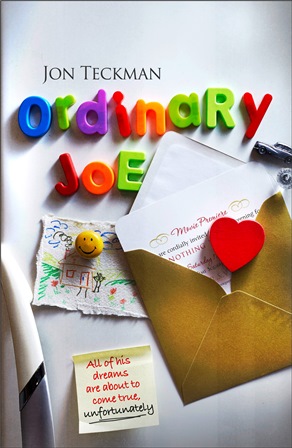Novelist Jon Teckman on the process of working with another writer in order to produce a screenplay.

‘Collaborative writing’: a concept guaranteed to strike fear into the heart of many writers! We’re a strange breed: we tend to work alone, weaving worlds full of characters and plots that we control and often finding it hard to show the fruits of our labours, even to our publishers. While most written work is collaborative in some way - just read the Acknowledgments section in any novel - the actual process of sitting and writing out the story in your head always seems an inevitably solitary endeavour.
I am an accidental co-writer. When my debut novel, Ordinary Joe, was optioned by Trademark Films, they also offered me the chance to write the screenplay. After months of work, I submitted my first draft and awaited the producers’ reaction. A few weeks later I received their response: my script was a good start but needed a lot more work if it was actually to be “makeable”. They were not firing me as screenwriter, they said, before adding the word “yet” as a gut-twisting afterthought.
I knew then that I needed some help – not, at this point, of the therapeutic variety but someone who could work with me to take my novel and turn it into an effective screenplay. Someone who knew the story well but wasn’t as close to it as I was and could see where it needed fixing; who knew my characters and understood their motivations and relationships, but had their own take on them. So I called Karen Archer, a friend and fellow writer (we had attended a Curtis Brown Creative novel writing course together) who had given me useful editorial feedback on earlier drafts of Ordinary Joe. Thus began our first collaborative screenplay partnership – and neither of us had any idea how it would work.
Karen read the existing draft of the screenplay and we met to discuss it. One of the producers’ main concerns had been that the main character, Joe West, was too passive, tending to react to events around him rather than driving them. This worked in the novel where there was more time and space to develop his character, but, they said, no actor would want to play this role as currently written in a movie. Karen told me she had an idea for resolving this problem but wanted to hold it back until later in the conversation. When, later, I suggested Joe needed a friend to confide in, someone with whom he could demonstrate a more assertive side of his personality, Karen smiled and passed me her written notes. Scrawled in capitals across the top of the page were the words “BEST FRIEND”. I knew then that it would work – we were metaphorically and literally on the same page.
The way we work together hasn’t really changed since that first meeting. What works for us is simple, distinct roles. I write the first draft, Karen reviews it and then we meet to discuss. We go through every scene in great detail, acting out the dialogue (to the general amusement of other café users) and throwing ideas around until we are both happy with the rewrite. Then, I redraft before sending the revised manuscript back to Karen to look at again. We go through this process several times to refine and polish each scene.
A vital part of the process is an open mind to new material but also the ability to incorporate someone else’s ideas seamlessly so that a script written by two people has a single voice/tone. Sometimes, when I redraft, I find that the changes we’d agreed make less sense or work less well than we’d imagined but the screenplay always evolves and becomes better for being challenged or stretched. Crucially, neither Karen nor I are precious or defensive about our own material or contributions – all that matters is making the screenplay as good as it can possibly be.
Writing can be a very lonely occupation but it doesn’t have to be. Working with a partner adds richness and vibrancy to the work and can make the whole process much more enjoyable. Writing collaboratively allows you to watch an immediate, honest reaction to your ideas and understand how someone else responds to your characters. Watching someone else laugh spontaneously, or wince, or cry, means that you’ve got it right and gives you confidence. On the other hand, weaknesses in plot and character and unconvincing dialogue are immediately revealed, so you need to trust and be sympathetic to your co-writer. Choosing the right collaborator is vital but you’ll know when you’ve got it right, because your work (and hopefully, your producer) will tell you.
Jon Teckman is a former Chief Executive of the British Film Institute. His debut novel, Ordinary Joe (which draws on his experiences working in the film industry), was published by The Borough Press in July, 2015. Karen Archer is a writer, beekeeper and Shortlist Fiction competition winner. You can follow her on Twitter here.
Comments